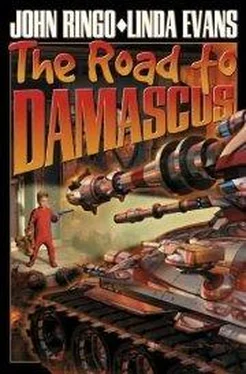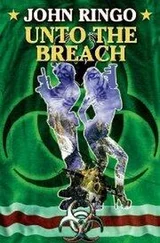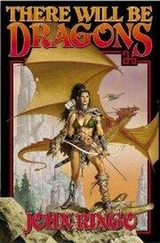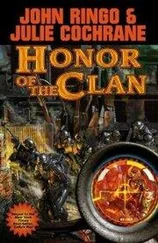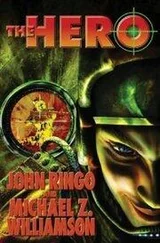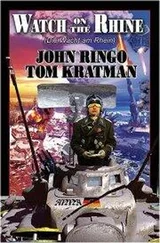“You be quiet!” The order is gasped out in a fierce whisper.
My treads lock.
Words fail me.
I sit in place, electronic thoughts spinning uselessly, and finally initiate diagnostics on my entire physical plant, looking for anything out of the ordinary. There is nothing wrong with my treads, their drive wheels, the complex gears governing their speed of rotation, or the engines that power them. I rev those engines to a scream, trying to break the drive wheels free of whatever is blocking their operation. I succeed only in filling this entire end of Klameth Canyon with noise, while heating the engines to no purpose.
I am still stuck.
The child has dropped its rifle and clamped hands across its ears. When the sound of my engines drops back into its normal range, the child plants fists on hips and tilts its face upward, toward my forward turret. I have little doubt that if I could make out the details of this child’s face, its expression would be a glare of righteous wrath.
“I told you to be quiet! Mommy’s sleeping! That was noisy and mean! I don’t like you at all!”
“The feeling is reciprocated.”
“What’s that mean?” My adversary demands in a hard and suspicious tone that is curiously adult, coming from a child so young.
“I don’t like you, either. Who are you?” I add, attempting to gain information that I might use to dislodge this recalcitrant obstacle from my path.
“I’m a Granger!” the child responds with ringing pride.
Terrorists and rebels begin training their offspring in class consciousness and divisive hatred at an early age. Fierce antigovernment prejudice is a hallmark of Grangerism. That prejudice is compounded of equal parts hatred, political separatism, open contempt for federal laws, disdain of urban culture, and a creed of guerilla-style violence that has produced thousands of terrorists whose sole aim is to destroy the legitimate government of this planet.
They have cultivated this prejudice alongside their fields of peas, beans, barley and corn, and lavish the same diligent care on it that they give to their crops. They coax it to grow into maturity, whereupon the rest of Jefferson reaps the inevitable harvest: wave after wave of terrorism and the wholesale destruction of civilian and government targets. I refuse to be stymied by a bad-tempered brat indoctrinated with the scathing, antigovernment prejudices grown to maturity in this canyon.
“It is obvious that you are a Granger. You are a resident of Klameth Canyon. This canyon has been a Granger stronghold for two centuries. It has been a breeding ground for rebel guerillas for two decades. The rebellion’s commander has chosen Klameth Canyon as his fortified headquarters and has barricaded himself with an unknown number of troops and heavy weaponry in the gorge behind your house. The president has declared this canyon a free-fire war zone. All of its residents are traitors and criminals. You are, therefore, obviously a Granger. You are also a traitor and criminal, by default. What is your name?”
The child has snatched up its toy rifle again. “ Mommy and Daddy told me never give my name to anybody who’s not a Granger. And Mommy says you like to hurt Grangers. She hates you. I hate you, too! And I’m not ever gonna tell you my name!”
This obstructive and nasty-tempered creature cannot be allowed to thwart my mission. I attempt to move forward again—
My treads lock.
Rage flares. I turn up the volume on my external speakers. “MOVE OUT OF THE ROAD!”
The child claps both hands across its ears again, then shouts right back. “YOU’RE BAD! YOU BE QUIET!”
I redline my engines. My treads lurch forward three glorious centimeters—
Then halt. In a fit of unbridled fury, I lock onto the child’s thermal signature with target-acquisition computers. Anti-personnel guns spin. I fire point-blank.
I try to fire point-blank.
Nothing happens.
I am so stunned, I sit stuttering. Shock courses through every psychotronic synapse in my electronic, multipartite brain. Even automatic subroutines register the system-wide, split-second flutter of pure horror.
I cannot move.
I cannot shoot.
I cannot allow a four-year-old to derail my mission. I am a Bolo. A Unit of the Line. I have logged one hundred twenty years of continuous service. I have suffered catastrophic injury more than once, but I have never been defeated. It is not within me to give up if there is a single erg of power flickering through my circuits. With a strong sense of desperation, I launch a system-wide, class one diagnostic. I must find the glitch that has caused widespread failures in my most critical systems.
Two point four-three minutes later, I make a startling discovery. There is a software lock in place. The blockage is tied to a complicated logic train that includes chaos elements, odd heuristic protocols that are tied to the method by which I learn from experience, and input from some closed and extremely antiquated logics. Once I have identified the tangle of elements contributing to the block, I realize that something about the situation I face — specifically this bizarre standoff with an unarmed child — has triggered the software block and the shutdown of my drive train and gun systems.
If I am to continue my mission, I must either change the situation or break the software block. The former will doubtless be easier to accomplish than the latter. I am a thirteen-thousand-ton machine. This is a four-year-old child. I initiate a concerted effort to dislodge it from my path.
“If you do not move out of the road, I will run over you.”
This is, of course, a bluff. It does not work. The child merely clutches its toy rifle and maintains an aggressive stance between me and my target.
“Get out of the way or I will wake up your mommy with really loud noises!”
“You better not!”
I yank up the gain on my external speakers, which were designed to cut across the cacophony of battle, conveying instructions to infantry support units. I give an immense shout—
—and my speakers don’t even buzz.
If I were human, I would howl at the moons like a rabid dog.
I try every threat, bribe, and intimidating tactic in my repertoire. The child simply stands its ground, glaring up at me, hands clenched around its toy rifle. I try firing high-angle mortars into the box canyon behind the house. My weapons systems remain locked as disastrously as my treads. I continue trying for fifty-nine minutes, thirteen seconds. Although I cannot see them, the moons have risen. I wait doggedly, hoping the child will grow hungry or weary enough to return to the house.
It shows no sign of doing so. A careful scan of the toy in the child’s hands reveals two distinct thermal images, suggesting two separate materials that radiate heat differently. One of the materials is a dense darkness against the brightness of the child’s warm hands and torso, forming the clear shape of a rifle. The other, which moves in a swinging fashion against the child’s heat signature, reveals the shape of a slender cord that travels from muzzle to something at the tip. The child holds one of the simplest toy guns ever made: a pop gun.
At the moment, it is more capable of firing than I am.
I face a dogged, determined enemy. The child has not abandoned its vigil in front of me. It is no longer in the road, but remains in front of my treads. It has been struggling for several minutes with something at the edge of the yard, something that the edge of my treads caught and crushed as I executed pivot turns, trying to break free. I cannot see well enough in my intermittent medium-IR range to determine what it is, exactly, that the child is holding, but the dark shape against the child’s bright heat signature suggests some sort of plant, with long, trailing stems. That plant has been uprooted, for obvious reasons.
Читать дальше
